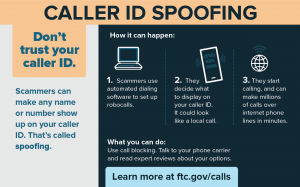What is Call Spoofing?
July 20th, 2021
Spoofing is when a caller deliberately falsifies the information transmitted to your caller ID display to disguise their identity. Scammers often use neighbor spoofing so it appears that an incoming call is coming from a local number, or spoof a number from a company or a government agency that you may already know and trust. If you answer, they use scam scripts to try to steal your money or valuable personal information, which can be used in fraudulent activity.
Here are some good ways to avoid being spoofed:
- Don’t answer calls from unknown numbers.
- If you answer and it’s not who you expected, don’t hang on, hang up.
- If a caller asks you to hit a button to stop getting calls, just hang up.
- Never assume an unexpected call is legitimate. Hang up and call back using a number you can verify on a bill, a statement, or an official website.
- Be suspicious. Con artists can be very convincing: They may ask innocuous questions, or sound threatening, or sometimes seem too good to be true.
- Don’t give out personal information – account numbers, Social Security numbers or passwords – or answer security questions.
- Use extreme caution if you are being pressured for immediate payment.
- Ask about call blocking tools for landlines or apps for mobile devices.
- Report spoofing scams to law enforcement, the FCC and FTC.
For more information on Spoofing, click here.
